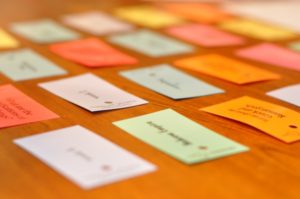
My oldest two kiddos are 6 & 8. Last year when they were 5 & 7, they both wanted to do Memory Masters. While I was excited about their willingness to try something difficult at such a young age, I knew that meant I had a lot of work in my future to help prepare them. Since they were so young, I set in my heart that we would work diligently together as long as they were interested, and tried to encourage them. If at any time they lost interest, I was ok with that. They both did well in nearly every subject except the timeline (since it wasn’t set to music). They didn’t “pass” my initial screening, so thier quest for Memory Masters stopped there.
This year, they are both earnestly striving to be Memory Masters again. For anyone wondering – “What exactly is Memory Masters?” I will briefly explain. In our Classical Conversations Program, the students memorize 8 subjects of information each week (Math, Science, History, History Timeline, English Grammar, Latin, Geography, and Scripture memorization). The program lasts for 24 weeks. To be a Memory Master, the student must:
1. Know all 24 weeks of information by week 21. (Yes, that means they have to memorize it early).
2. Be able to not only name the geographical locations, but locate them on a map.
3. They must be able to recite the information with no assistance from the instructor other than the prompt question.
The checking process is somewhat as follows (but varies by community):
1. Week 21 – complete check of every subject by parent. If they pass, they move to step 2.
2. Random Spot-check of subjects by another parent. If they pass, then they move to step 3.
3. Complte check of every piece of memory work by the child’s tutor. if they pass, then move on to stpe 4.
4. The Director will comeplete a random spot-check. If all are correct, the student is declared a Memory Master, and in most communities is awarded in some way for their efforts (T-shirt, medal, etc.)
My friend Brandy over at www.HalfaHundredAcreWood.com wrote a great post about Memory Masters during Cycle 3. You can check it out for more detailed info. She also recently wrote a short post with a free downloadable sticker-book that has been fun around here – although I pay out with pennies per sticker not dimes…. (What can I say – in my “employed outside the home days”, I was a business banker) 🙂
I wanted to share a few things have made Memory Master prep this year much easier for us:
1. Geography was our most-difficult/least-kept-up-with subject this year. I am not sure why. We are definitely a “musical-memory” family. I downloaded the Geography songs on CC connected. Go to the file sharing site, then search by Cycle 1, and file type:mp3 to find all of the audio songs available. There are two geography songs that we liked best. One covers weeks 1-12 (by lydialou – for some reason this is posted under “all” cycles so you will need to select “all”), and the second covers weeks 13-24 (by fjmontgomery – under cycle 1). Seriously, we caught up phenomenally in geography in one week. I have had those songs stuck in my head all week, but I guess that is the point. If your family is struggling with Geography, I strongly suggest them! Ok, so how do we use them to memorize? That brings me to item number 2….
2. We downloaded the “official” CC Geography Notebook off of CC connected that has the official outline maps. I placed them in a sheet protector, with the colored and labeled version on one side, and the blackline master on the other. We use the colored and labeled version first to label and locate the places, then turn over the page and find and label them on the outline map.
3. The Science songs on CC connected have been AWESOME for us! (Thank you to Amy Joy – wherever you are!!!). Not only do they help us remember the information, but the question is built right into the song, so the kids have no trouble retrieving the information in their little noggins! To search for the Science songs, go to the file sharing site, then search by Cycle 1, and file type:mp3 to find all of the audio songs available. The science songs we like (there is one for each week) are by Amy Joy, so search by member “Nogreaterjoy5”, and you will find them.
4. While you are downloading the science pieces above, go ahead and download the Math songs (the math songs we use are also by “Nogreaterjoy5”) – the equations are so much easier set to song! Then have your student use the math lapbook piece from My Memory Work Lapbook 1.4 to “build the equation” (photo above). Building it helps them put a little bit more concrete understanding to their math. Verbal memorization of algebraic equations can be hard for an adult, let alone a child “open parenthesis a plus b closing parenthesis plus c” – you get my drift. This lets them get hands on.
5. Play games. We use the flashcards most often to review. The most common game we play is not even all that fun or complicated, but the idea of competition works for my two. I place all of the cards face down in a grid on the floor (picture at the top of this post). Then they get to pick a card and try to answer it. If they don’t get it right, the other child can “steal” it by answering it correctly. Then it moves to the next kids’ turn, etc. At the end, they add up their cards. I usually give them some sort of reward depending on the amount of cards we are playing with. Maybe it is one minute of computer or ipad time per card, or a penny per card, or whatever. It doesn’t take much, but we get through all of our work this way with them staying fairly well focused since they want to steal the other person’s card. Another option is to use your Candyland board for review (photo above). The flashcards match all of the colors except for Latin – I have the kids do Latin on any of the “Image” cards. In the case of a regular colored square card, they get to move forward if they answer their question correctly. In the case of an image card, if the image they drew is behind them, then they have to move back to that space if they miss it.
6. If your child is young, know when to quit. I always want learning to be fun. So when the 6 year old loses interest, I let him go wrestle his brothers or play with his legos. If he ever achieves Memory Masters, I want it to be because of his effort, not because of mine. So we take it one day at a time.
7. Figure out what the child knows and what they do not so you know what to focus on. I use this easy chart – either mark it with a sticker, or cross out with an X the questions your student has mastered. Put the pages back-to-back and place them between a page protector to use it as a mark-off sheet (dry erase) as you review what they still need to master. FREE MEMORY MASTER FULL-PAGE STICKER SHEET (pictured above) (Download Page 1 / Download Page 2)
This year with the timeline set to music, I think they have a shot at pulling it off. Whether they pass or not, I am just encouraged by their earnestness to try hard things and thier belief in their ability to learn.
This time of the year can be hard for homeschool moms since it can be easy to lose our momentum. It is this time of the year that I think gives us the best feedback on what we are doing that is working, and what we did this year that did not work as well. Once again this year, I am reminded how the classical education really gives the kids something they can hold on to, and I am seeing them build upon the “pegs of understanding” that have been mounted in their brains.
Happy Memory Master proofing, and God Bless!
~Karen




Thank you for sharing all these great ideas for MM. This was our first year of CC and we loved it!!!